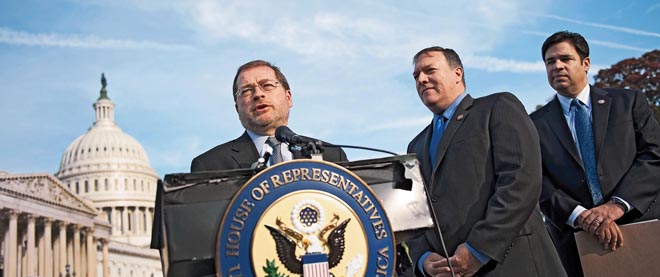Republicans divided over Taxpayer Protection Pledge as fiscal cliff looms
‘Zealot’ Grover Norquist continues rally against taxes
Tom Williams/GETTY IMAGES
Share

Long before the Tea Party movement’s mass rallies or the ideological inquisitions of recent Republican primary races, there was the bearded and burly man from suburban Boston.
In 1981, at the age of 25, Grover Norquist, armed with economics and business degrees from Harvard, came to Washington on a mission to help carry out the Reagan revolution and promote his passionate belief in smaller government. His weekly “Wednesday meetings,” held in a conference room at his Washington headquarters, regularly attracted conservative lawmakers, activists and commentators. And Americans for Tax Reform, the activist group he founded in 1985, has since become a permanent fixture of the political landscape. “The government’s power to control one’s life derives from its power to tax,” the group’s mission statement reads. “We believe that power should be minimized.”
“I don’t want to abolish government,” Norquist explained in a 2001 radio interview, “I simply want to reduce it to the size where I can drag it into the bathroom and drown it in the bathtub.”
A key tool in his effort was the “Taxpayer Protection Pledge,” signed by almost all congressional Republicans. With it, lawmakers pledge to oppose “any and all efforts” to increase taxes, and promise that “any” reduction of deductions and credits be offset by lowering overall tax rates.
Now, President Barack Obama and congressional Republicans are racing to come up with a deal that would avert the $500-billion hit to the economy from the expiration of Bush-era tax cuts coupled with automatic spending reductions that are scheduled to kick in Jan. 1—sudden austerity that could send the economy back into recession. Obama, who won re-election campaigning on higher taxes for the rich, insists that they be included. But as they seek a mutually acceptable plan to wrestle with a budget deficit of $1.2 trillion this year and a $16-trillion debt—the equivalent of 100 per cent of U.S. GDP—the Republican “no new taxes” pledge is a straitjacket.
Yet according to Norquist, now 56, the pledge is irrevocable. “It is considered binding as long as an individual holds the office for which he or she signed the pledge,” his website states, pointing out that candidates were voted in on the basis of signing it.
In the face of the showdown over the looming “fiscal cliff,” however, a handful of Republican lawmakers have begun to balk. And Democrats are waiting to see whether they are the exception or the first crack in the once-impenetrable wall that Norquist spent his career building.
House Speaker John Boehner has already said that Republicans would agree to raising $800 billion by closing some “loopholes” or tax deductions, a technical violation of the pledge. Some Republicans would even consider signing off on Obama’s demand for higher tax rates on upper-income earners.
First came a Republican senator from Georgia: “I care more about my country than I do about a 20-year-old pledge,” Saxby Chambliss told a hometown TV station on Nov. 22.
Next, South Carolina Republican Lindsey Graham delivered the same message. “I will violate the pledge for the good of the country,” said the senator. “The only pledge we should be making to each other is to avoid being Greece.”
Norquist shrugged off the threats as mere posturing. “No pledge-taker has voted for a tax increase,” he told CNN. “We’ve had some people discussing impure thoughts on national television.” But the intra-Republican conversation quickly grew more heated.
Peter King, a plain-spoken Republican congressman from New York, says he doesn’t consider himself bound by Norquist either. “A pledge you signed 20 years ago, 18 years ago, is for that Congress,” he said. “If I were in Congress in 1941, I would have supported a declaration of war against Japan. I’m not going to attack Japan today.” Norquist shot back that King was trying to “weasel out” of the pledge. “I hope his wife understands that commitments last a little longer than two years,” he said.
King exploded, calling Norquist a “low-life” for bringing up his marriage. He’d “better hope he doesn’t meet [my wife],” he told Politico. “She’ll knock his head off.” Apparently King was not the only Republican wishing physical harm on Norquist.
Alan Simpson, an 81-year-old former Republican senator from Wyoming who was tasked by Obama with helping America find a way out of its fiscal problems—and who co-authored the Bowles-Simpson plan, which aimed to do just that—had a few choice words for Norquist, whom he called a “zealot.” “So how do you deal with someone who comes to stop government?” Simpson said. “Grover wandering the earth in his white robe, saying he wants to drown government in the bathtub. I hope he slips in there with it.”
But within days, things looked brighter for Norquist. On Thursday, Obama came out with his negotiating position: he proposed $1.6 trillion in tax increases (double what Boehner, the Republican Speaker, was offering), $50 billion in new spending and only $400 billion in spending cuts (Republicans want more than a trillion). Graham called it a “joke.”
On Monday, Norquist told National Public Radio the proposal was so unappealing to Republicans that he didn’t have to worry about anyone breaking their pledge to support it. “The Obama administration,” he said, “has solved all my problems.” At least for the moment.